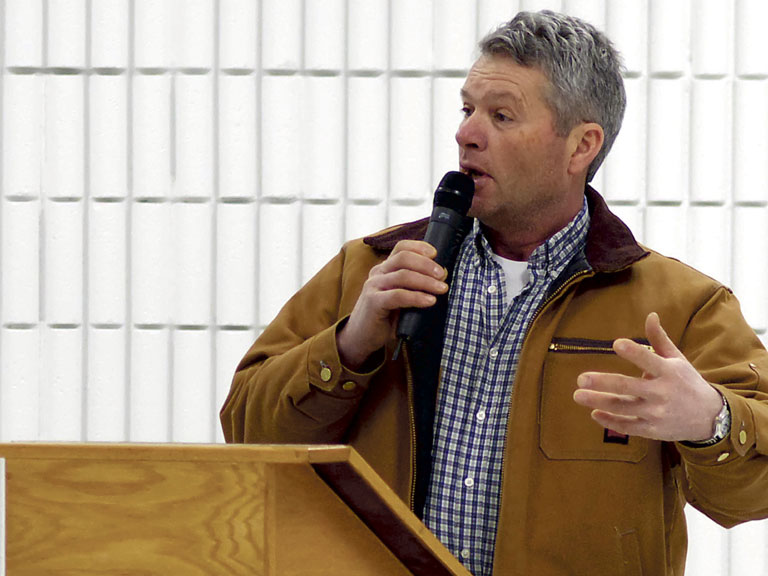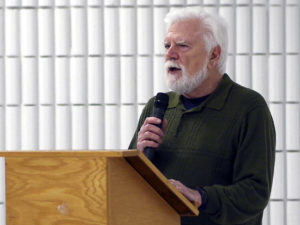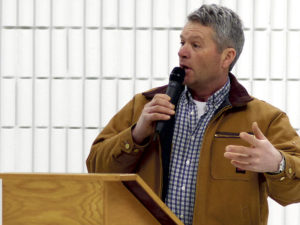County News
Who pays?


Gary Mooney speaks to a committee of council, arguing against a reduction in the Farm Tax Ratio.
Council hears residents’ views on Farm Tax Ratio
Over 100 people—many of them farmers or farmland owners—attended a special council committee meeting on Thursday at the Prince Edward Community Centre in Picton. The purpose of the public meeting was for council to hear comments from residents on the subject of the Farm Tax Ratio. Prince Edward Federation of Agriculture president John Thompson has proposed that council mitigate large increases in farmland property taxes as a result of increased assessment values. The mayor and all but one of the councillors were present to listen to the deputations of seven people, plus additional comments from members of the audience.
In recent years, the value of farmland has increased faster than increases in residential properties, and as a result its share of the total property tax collected by the County has risen from 1.6 per cent in 2016 to 1.9 per cent in 2018 and is projected to rise to 2.87 per cent by 2020. Thompson’s proposal aims to slow down but not eliminate the rate of rise by transferring some of this increase back onto residential homeowners. The County has the power to set the rate of farmland tax to a value of up to 25 per cent of the residential rate. Thompson is asking for a rate of 20 per cent.
Gary Mooney made the first deputation of the meeting, arguing against a reduction in the rate. He asserted that the tax increase was a minor part of farm operations, that any tax relief would benefit large, well-established farmland owners and that it was unfair to shift a greater load onto residential property taxpayers. He urged council to instead set up a grant program to provide assistance to new or small farming start-ups.
Mooney was followed by Ben Le Fort, senior policy analyst for the Ontario Federation of Agriculture. He spoke in favour of the tax rate reduction, noting that average farmland assessment had increased by 110 per cent, compared with a 13 per cent increase in residential assessment.
He said that farmland owners would be paying more property tax even if this proposal passed.
“In fact, if the tax ratio is adjusted for the next few years, farm property owners will still be paying a bigger slice of the tax pie than they did in 2016,” said Le Fort. “It would be just that we are slowing down the increase.”
Le Fort was asked by Mayor Robert Quaiff whether any other municipalities had reduced the farm tax rate to help offset the burden placed by increases in assessments. Le Fort replied that Chatham-Kent, Durham, Caledon and the Hamilton area had done so, and a number of other municipalities were considering it.

Beef farner Lynn Leavitt addresses a special meeting of council, speaking in favour of a reduction in the Farm Tax Ratio.
Next, John Thompson said that under his proposal farmers would still be paying $851,000 more in taxes cumulatively to 2020, versus $1.4 million without it. He acknowledged that the difference would be made up by the residential tax base. Despite this, Thompson says that the residential contribution to the total property tax would actually decline from 90.2 per cent to 90.1 per cent.
“The negative effect on farm families and the reduced spinoff into the local economy would be more manageable with tax increases around 70 per cent rather than over 110 per cent,” he said in favour of the reduced tax ratio. “Remember that most of the farm’s income is circulated back into the local economy for the purchase of supplies and services, jobs and taxes.”
Thompson also faced a number of questions from council. Councillor Lenny Epstein asked whether there could be a more targeted tax relief given to small farms. Thompson replied that there was no way of knowing who would need help.
Rosalind Adams has a farm near Milford and has seen her assessment more than double in value.
Surprisingly, she thinks that reducing the Farm Tax Ratio is not the answer.
“The property tax that I pay is approaching 10 per cent of my farm income, which has not doubled, or even increased much, over the last assessment period,” she said to council. “I don’t think the property tax increase being imposed on our farm is fair, but I don’t think reducing the Farm Tax Ratio is the answer. There’s a way bigger problem with the property tax regime than its impact on farmers. This way of collecting taxes is not fair on anyone. Rising property values don’t make us richer.”
Adams proposed to council that the residential tax rate be adjusted downwards, which would automatically lower farmland taxes.
Adams was followed by Bob Burkinshaw and then Deb Hudson, who both spoke in favour of Thompson’s proposal. After them came Dennis Fox, the final person on the formal agenda. He spoke out against any changes to the tax ratio. “I’m opposed to the OFA proposal for no other reason than the way it was presented to the community,” he said. “The farmers do not want to pay, but they expect the residential taxpayers to pay…sixty-three per cent of [residential taxpayers] are seniors on fixed incomes. That’s a reality that this council has got to face.”
A number of people in the audience also brought their concerns to council. One of them, George Baranyai, opposed the reduction in the Farm Tax Ratio. Sarah Jenkins, who does not own farmland, spoke in favour of Thompson’s proposal. Curtis Walt was also in favour, and made an impassioned plea to council. “Making us pay a larger share of the tax burden for services we aren’t receiving doesn’t make any sense,” he said. “We pay on our residential houses, we pay the same as everybody else. Why do we have to pay more on the land we are making our living on? We’re asking council to take leadership on this issue.”
But perhaps beef farmer Lynn Leavitt made the most telling point. “The value of the land has nothing to do with the income that comes off that farm. That’s one of the objections to being taxed to that point,” he said. “We are the people that produce food for your children and grandchildren. This is a really important issue you guys [council] have to deal with, and I wouldn’t want to be in your boots. Remember the decisions you make now, that deal with farmers and food policy, is the future of your children’s and grandchildren’s food security.”
Council will consider motions relating to the Farm Tax Ratio at its meeting on Tuesday, March 13.

Comments (1)